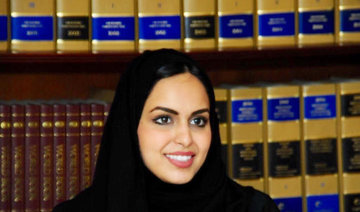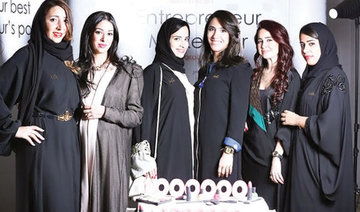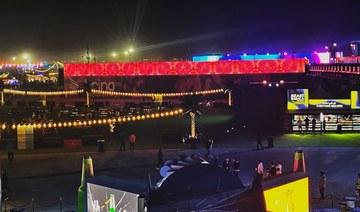JEDDAH: It was a year to remember for many Saudis. For the first time in history, 30 Saudi women took their seats as members of the Shoura Council in February 2013, and were sworn in before the presence of the late King Abdullah bin Abdul Aziz.
Five years on, female Shoura Council members are still playing a major role in different issues concerning social development in the Kingdom.
Saudi women in the Shoura Council have come a long way. Their achievements have been recorded in history and their powerful voices continue to be heard.
None of the women needs introduction, with each having a long history of achievements even before their appointment.
Lina Al-Maeena spent more than 15 years leading a fight for women’s sports in Saudi Arabia. She founded Jeddah United in 2003, Saudi Arabia’s first private female basketball club.
Despite facing a backlash, she pushed for acceptance in the conservative community and has finally won recognition with the realization that it is important for women to participate in sports activities.
In compliance with Vision 2030 — which includes development programs preparing the Kingdom for a promising future — the Saudi government has committed to elevating the status of sports in the Kingdom, a boost to promoting physical fitness for both men and women alike.
But promoting sports activities for Saudi women is not Al-Maeena’s only goal.
“It’s not simply about the empowerment of women in sports from an athletic point of view, I’m also looking at it from an economic perspective,” she said.
“Sports as a business is in line with the goal of Vision 2030 — to increase the number of women in the workforce from 22 percent to 30 percent. It’s not just the health, social benefits and development aspects, I’m very big on economics too.”
“When it comes to women's empowerment, I like to look at a gender as a whole, not just women,” adds Al-Maeena. “I advocate under the Shoura Council dome, for many environmental issues. Saudi Arabia is a member of the G-20 and we have a global responsibility to become supporters of a green lifestyle to sustain effective development.”
“It’s a golden age for Saudis and as women, we’ve come a long way. Every other day you see things happening and it’s a great celebration of achievements. We’re living this era of historical change, both pre- and post-Vision 2030 and we’re making up for lost time,” said Al-Maeena.
Fawzia Abalkhail, a professor of Information Technology and Education at Princess Noura hUniversity (PNU) who has a doctorate in the philosophy of education, is one of 20 new female Shoura members appointed in 2016.
She believes that every member of the Shoura Council has a national responsibility entrusted to them by the Custodian of the Two Holy Mosques by virtue of his appointment.
“As a female Shoura Council member, I support development issues in the education sector, health sector, public services and social affairs … [and in doing so] to support many fellow members in women empowerment issues,” said Abalkhail, appointed in 2013-2014 as the undersecretary of PNU for Graduate Studies and Scientific Research and vice president of PNU for health affairs.
“We focus on finding means of support and setting the standards that will increase women’s contributions in matters of social development, provide greater chances for assuming higher governmental positions as well as managerial roles in the private sector,” she said.
Abalkhail is of the opinion that Saudi women must gain skills in various fields in order to contribute. She believes a woman plays a pivotal role in society to ensure its stability and structural health, a role that is no less than a man’s.
“I am keen on laying the foundations and the right means in which all women can acquire the knowledge they need to enrich their social contributions,” said Abalkhail, who is also a member of the Saudi Society for Education and Psychological Sciences.
“Women are required to be their own self-development researchers. I am very interested in making sure education is improved, facilitate it and widen the scope beyond academic constraints. In doing so, a wider range of knowledge exchange will be provided between all those who seek it to build healthier social practices.”
Education has played a major role in empowering women in Saudi Arabia for many years.
Dr. Alia Aldahlawi, an associate professor at the Department of Biology-Organisms in the Faculty of Sciences at King Abdul Aziz University, agreed that education was key to ensuring women qualified for senior positions.
“The Kingdom’s scholarship programs have sent countless of women and men alike to get an equally challenging education and thus return to hold positions they’re most qualified for. Society must place their trust, reverse their mindsets to empower our women,” she said. “It’s also important that women realize that it is essential they work harder and prove themselves to the naysayers.”
“To my knowledge, there are approximately 1,000 Saudi women professors with different scientific occupations in many universities of the Kingdom,” Aldahlawi said.
“They’ve held high administrative positions with years of experience. We see female diplomats employed in the Saudi Foreign Ministry, researchers and inventors in the health sector, economic and business experts and so much more.
“They are pioneers of their fields and their abilities are an asset to the Kingdom that must be utilized.”
Saudi women’s voices in Shoura Council continue to be heard
Saudi women’s voices in Shoura Council continue to be heard
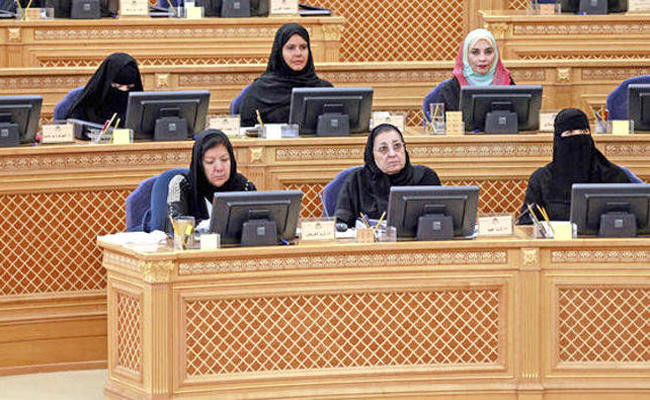
KSrelief sends aid to Sudan and Pakistan

- Agency provided 956 food parcels, benefitting nearly 5,500 people in Sudan
- Nearly 600 shelter kits distributed in Pakistan's Gwadar to 4,000 people
Saudi Arabian aid agency KSrelief distributed hundreds of food aid packages and shelter kits to thousands most in need in Sudan and Pakistan, state news agency SPA reported on Tuesday.
The agency provided 956 food parcels, benefitting nearly 5,500 people in Sudan, while nearly 600 shelter kits were distributed in the Gwadar district of Pakistan’s Balochistan province, benefitting more than 4,000 people.
The assistance is part of a series of relief and humanitarian projects implemented by KSrelief across the world.
Saudi, Japan discuss ties at Vision 2030 business forum in Tokyo

- Focus on mutual investment growth, says Saudi official
- Manufacturing, entertainment and health are key areas
TOKYO: The Saudi Arabia-Japan Vision 2030 Business Forum began in Tokyo on Tuesday with over 300 industry officials and leaders set to discuss ways to boost trade, investment and cultural ties.
In her keynote speech, Sara Al-Sayed, Saudi Arabia’s deputy minister of international partnerships at the Ministry of Investment, outlined plans for further collaboration between the two nations.
“Under the Saudi-Japan Vision 2030, we aim to take this partnership to a new level,” she said. “We want to leverage our mutual strengths, drive sustainable mutual economic growth, enhance technological innovation, and promote cultural exchange. We will be able to unlock the potential to expand the Japan partnership to be a key driver of growth.”
She added: “We have noticed in the last decade the strength of the partnership between Saudi Arabia and Japan. Over the last decade alone, the number of companies that have been established in Saudi Arabia by the Japanese has doubled and we have over 50 headquarters that have been established in Saudi Arabia. This forum will act as a catalyst to accelerate this growth and translate interest into investment.”
Sessions at the forum include “Forging stronger manufacturing collaboration between KSA and Japan,” “Collaboration in the new era of sustainability and circular economy,” “Reinventing entertainment and gaming industries across borders,” and “Expanding the area of cooperation in healthcare.”
KSrelief sends aid to Sudan and Pakistan

Saudi Arabian aid agency KSrelief distributed hundreds of food aid packages and shelter kits to thousands most in need in Sudan and Pakistan, state news agency SPA reported on Tuesday.
The agency provided 956 food parcels, benefitting nearly 5,500 people in Sudan, while nearly 600 shelter kits were distributed in the Gwadar district of Pakistan’s Balochistan province, benefitting more than 4,000 people.
The assistance is part of a series of relief and humanitarian projects implemented by KSrelief across the world.
KSrelief to install water desalination plant at Mogadishu hospital

RIYADH: Saudi Arabia’s aid organization KSrelief on Monday signed an agreement to install a water desalination plant at the kidney dialysis center of Banadir Hospital in Mogadishu.
The initiative in Somalia’s capital will benefit 270 individuals.
KSrelief’s Assistant Supervisor-General of Operations and Programs Ahmed bin Ali Al-Baiz signed the agreement at the center’s headquarters in Riyadh.
Elsewhere, KSrelief on Saturday distributed 585 shelter bags in Gwadar district in Pakistan’s Balochistan province, benefiting 4,095 families in the flood-affected areas.
The program is a part of KSrelief’s third phase of support for vulnerable people in Pakistan.
Also, KSrelief on Saturday distributed 956 food baskets to displaced families in the north of Sudan, benefiting 5,497 individuals. This is a part of the second phase of KSrelief’s food-security project in the country.
Digital wellbeing summit at Ithra to confront technology’s dangers, advantages

- Event at Ithra will have over 110 digital experts, 70 speakers from 20 countries
DHAHRAN: After a two-year hiatus, the second Sync Digital Wellbeing Summit 2024 returns to the King Abdulaziz Center for World Culture, or Ithra, this week for discussions and debates by world-leading experts.
Scheduled for May 22 and 23, Ithra will be buzzing with all things that merge technology and wellness, and will feature 110 digital experts and 70 speakers from 20 countries.

“The Sync Summit 2024 is not just another conference. It’s a platform for meaningful discussions, critical reflections, and collective actions for a better digital future,” said Wadha Al-Nafjan, head of digital wellbeing at Sync. “As we navigate the digital paradox, it is vital to recognize our responsibility in shaping the world we want to live in.”
Topics including algorithmic homogenization and identity loss, AI’s impact on the creative industries, and misinformation will be tackled under the theme “Confronting the Digital Paradox.”
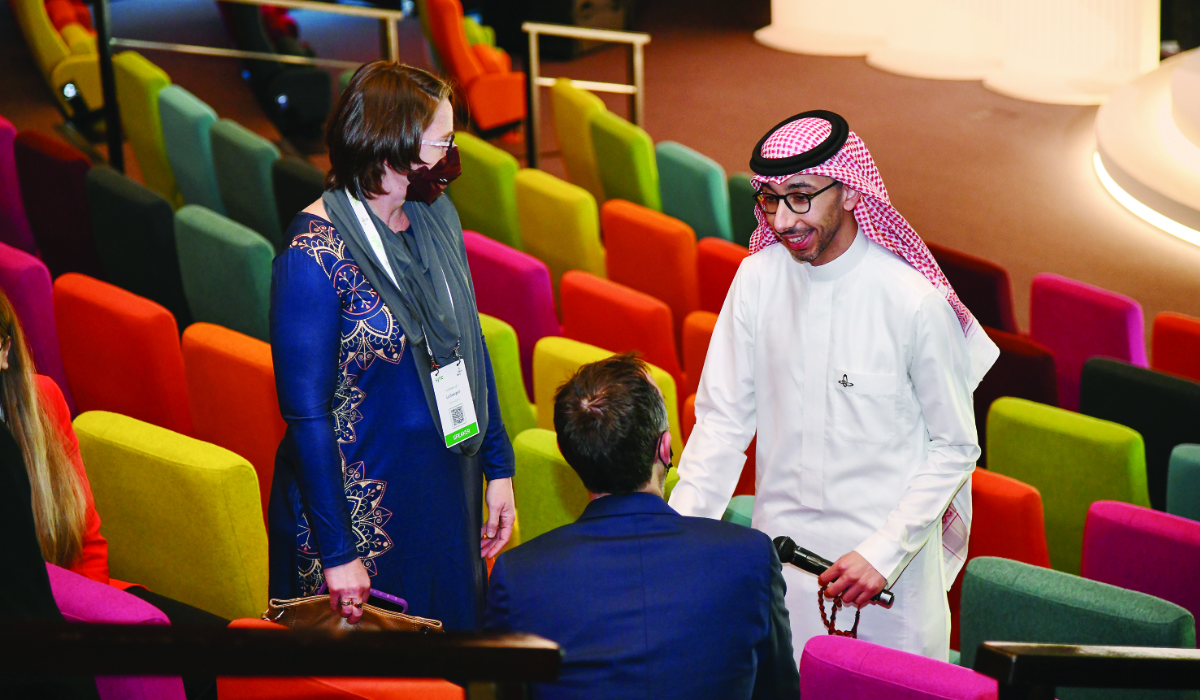
The summit will be held at the Ithra headquarters in Dhahran, with a live stream available.
Day one, organized around the sub-theme “Cuts Both Ways: Wrestling with the Tensions of the Digital Era,” includes seven panels, two fireside chats and two keynote talks.
It’s a platform for meaningful discussions, critical reflections, and collective actions for a better digital future.
Wadha Al-Nafjan, Head of digital wellbeing at Sync
Day two, centering on the sub-theme “A Digital Renaissance: Shaping Our Relationship with Digital for a Better Future,” will have eight panels and three keynotes. In addition, it will have the Sync Spotlight series finale, for which creative influencer Omar Farooq will screen his new documentary, “The Dark Side of Japan.”
Although there was no summit last year at Ithra, the Sync team conducted extensive research globally that led to some compelling findings.
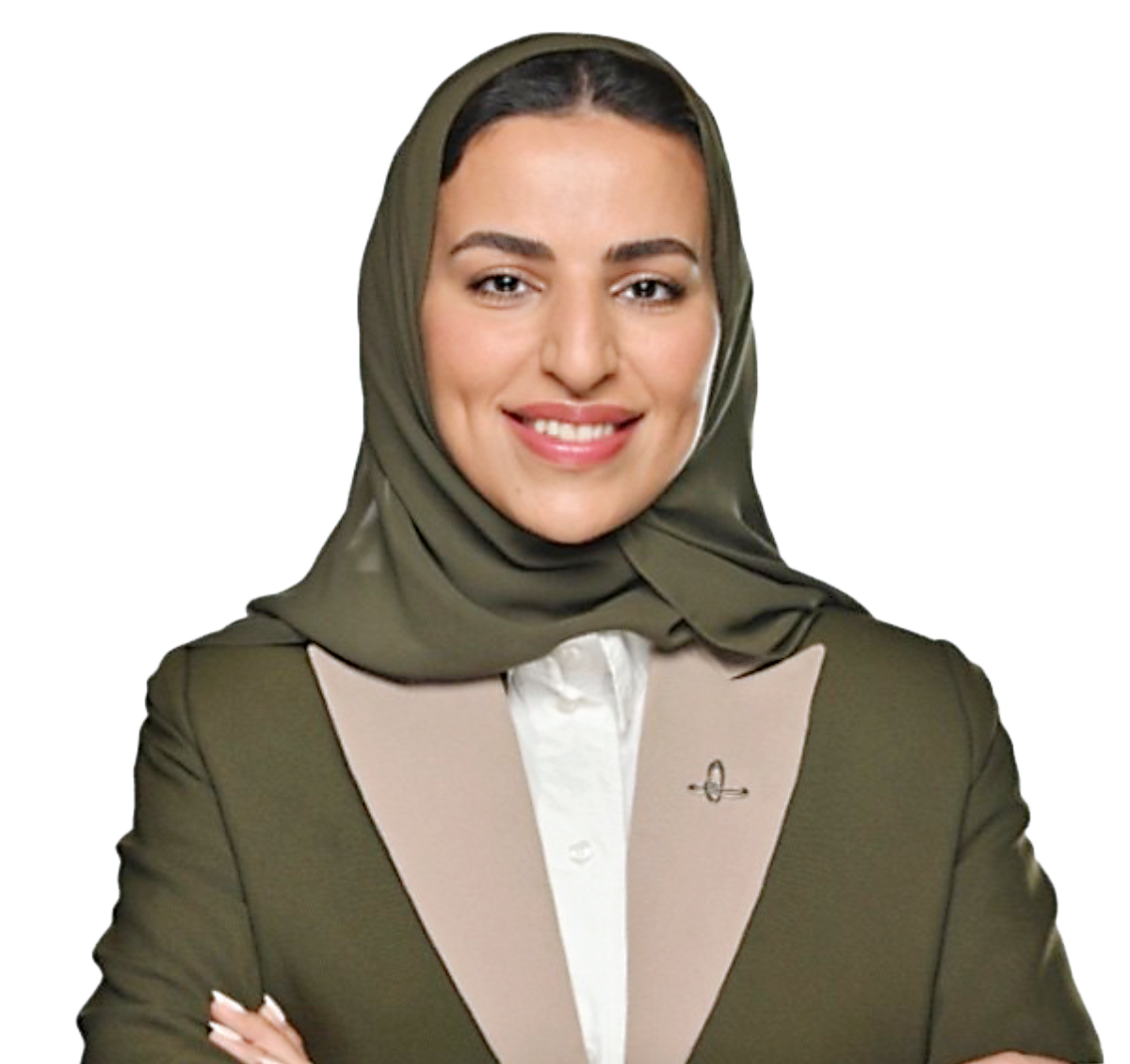
According to their research, 81 percent of those surveyed are concerned about the unsolicited collection of their personal data, 53 percent struggle to maintain boundaries between their work and personal lives, while 66 percent believe that the internet needs more regulation. About 73 percent of participants think social media was designed to be addictive.
Furthermore, the average time spent online daily has gone down, compared with 2021. About 68 percent claim to understand AI, 87 percent think technology is allowing people to work and study more flexibly, and 91 percent use digital devices to access resources including books and tutorials.
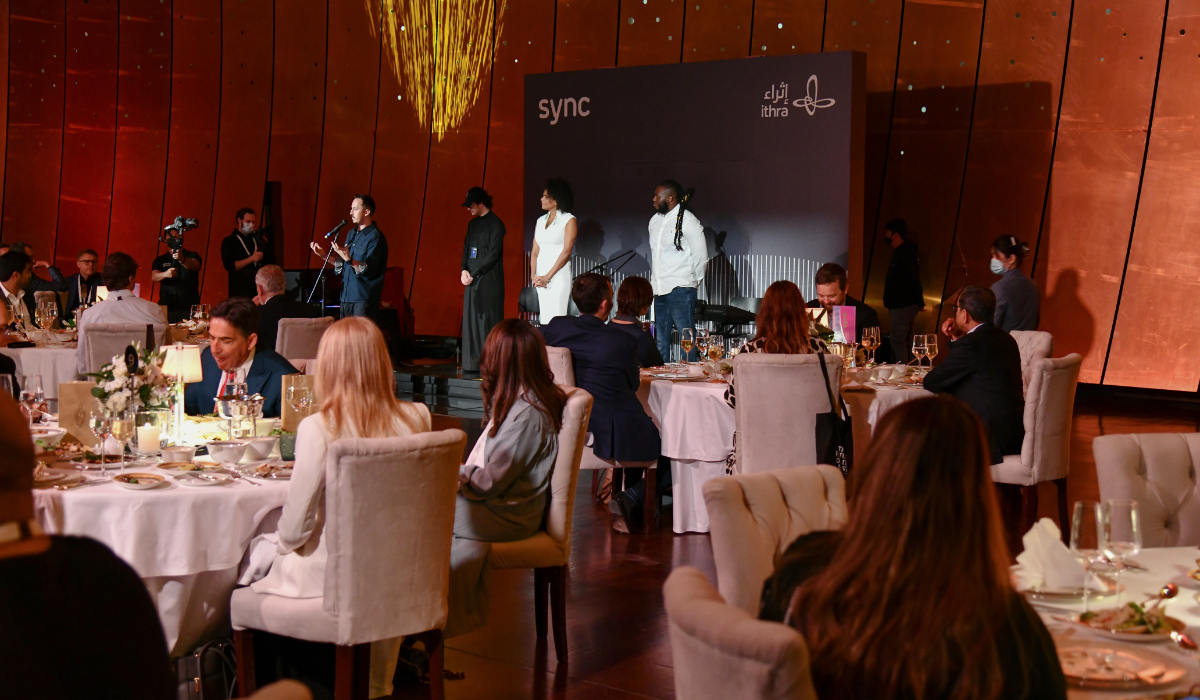
“Never before has the world been so connected to everything and everyone. We know technology has improved our lives, but it also has the painful potential to distract and harm,” Ithra said in a statement to Arab News. The summit’s activities are geared toward “ensuring that we as humans come together to keep digital technology in check and working towards the greater good, safeguarding its future, and our own.”
The event will bridge the gap between academic research, industry practices, and end-users regarding digital wellbeing through a variety of sessions.
Sync Spotlight
A series of sessions will run in parallel to the two-day Sync Summit stage program, offering greater interaction between speakers and audience members.
Sync Action Forum
The worldwide Gen Alpha Forum, an initiative developed by Sync Research with McCann Worldgroup, will see the community expand to include Saudi Arabia parents of Gen Alpha children, as well as educators, and other Gen Alpha stakeholders.
Majlis
In partnership with Johns Hopkins, which has a local hospital at Aramco, the Majlis will host three sessions exploring digital wellbeing with educators, researchers and students.
The Plaza
The gamified experience will dive into the findings compiled by the Sync Research team through the lens of three projects which were developed with partners Horizon Group, PSB and McCann Worldgroup.
Sync Immersive
In this interactive journey, the organizers promise to provide a three-step experience designed to impact participants’ emotions and understanding, while guiding them into navigating the complexities of digital ethics.
Podcast
The booth experience will serve both as a studio to record live podcast episodes hosted by Mo Gawdat, formerly of Google, and as a multi-functional space for hosting media interviews. Saudi Arabia’s Mohammed Islam, host of the English-language podcast, The Mo Show, will also be present.
Other notable speakers this year include US data scientist and AI specialist Rumman Chowdhury; Saudi Arabia athlete, FIFA World Champion and owner of an esports team, Abdulaziz Alshehri; and Apple Inc. co-founder Steve Wozniak.
One May 21, Ithra will host the Global Digital Wellbeing Assembly, a gathering of experts from across the Kingdom and the globe to discuss the guiding objectives and roadmap for a new digital wellbeing society.
Registration is now open and attendance is free.


